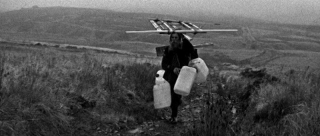Date: 21 October 2011 | Season: London Film Festival 2011 | Tags: London Film Festival
TWO YEARS AT SEA
Friday 21 October 2011, at 9pm
London BFI Southbank NFT1
Ben Rivers, Two Years at Sea, UK, 2011, 88 min
Using old 16mm cameras, artist Ben Rivers, who has been nominated for the Jarman Prize and has won a Tiger Award at Rotterdam, creates work from stories of real people, often those who have disconnected from the normal world and taken themselves into wilderness territories. His new long-form work extends his relationship with Jake, a man first encountered in his short film This Is My Land. The title refers to the work Jake did in order to finance his chosen state of existence. He lives alone in a ramshackle house, in the middle of the forest. It’s full of curiosities from a bygone age, including a beloved old gramophone. We see his daily life across the seasons, as he occupies himself going for walks in all weathers, and taking naps in the misty fields and woods. Endlessly resourceful, he builds a raft to fish in a loch. Jake has a tremendous sense of purpose, however eccentric his behaviour seems to us. The presence of the camera is irrelevant to him; he has no desire for human contact, and is completely at home in his environment, the nature around him and his constructed abode. Rivers’ gracefully-constructed film creates an intimate connection with an individual who would otherwise be a complete outsider to us. (Helen de Witt)
Also Screening: Monday 24 October 2011, at 1:30pm, NFT1
PROGRAMME NOTES
TWO YEARS AT SEA
Friday 21 October 2011, at 9pm
London BFI Southbank NFT1
TWO YEARS AT SEA
Ben Rivers, UK, 2011, 35mm, b/w, sound, 88 min
Ben Rivers’ feature Two Years at Sea follows Jake Williams (also the subject of one of Rivers’ earlier short films) over the course of two years; a man living in complete isolation in a tumbledown home nestled amidst a magnificent forest, a self-imposed solitary exile from society and modernity. Free from dialogue or interaction with his subject, Rivers’ film makes no attempt to psychologise his subject’s Walden-esque existence, instead documenting over a series of long, often static shots the minutiae of Jake’s self-sufficient relationship to his environment.
Close-ups of weathered photographs offer glimpses of a former life equally in thrall to nature; one spent with friends or family members, now simply ghosts adrift in memory. We watch Jake wake and shower, fetch water and firewood, and in an extraordinary single shot build a raft from an inflatable mattress, taking to the water to fish. His existence is one seeming to grow out of as much as disappear into his surroundings, the ramshackle remnants of modern life which fill his home reconstituted to new purpose, the house itself slowly fusing itself to the landscape. Jake too, as in certain shots reflections of foliage in the windows of his campervan create an impression of the landscape enveloping him, consuming him as he rests.
This symbiosis of the organic and mechanical is beautifully captured by Rivers’ monochrome photography; shooting on reclaimed 16mm Bolex cameras, the shifting textures of the images have a makeshift feel, as though the camera were put together by Jake from parts found in one of his many junk-filled cupboards, the pops and crackles of his bonfire at the end mirrored by those of the celluloid, the flares and white-outs adding to the very fabric of the photographed scenery; the film itself acting on what its capturing.
The serenity of Jake’s gaze in the breathtaking final shot speaks more than an hour of interview footage could, it’s a privilege to be able spend ninety minutes in the company of such an extraordinary individual, one with seemingly no need for human interaction of any kind and it’s a measure of Rivers’ respectful directorial stance that his/our presence never feels intrusive. Much as when the camera looks out from the window of Jake’s observation-tower creation, over the silent, snow-capped forest, one can begin to understand his reason for being there; when it takes in Jake, gazing through the same window, one can equally understand Rivers’ reason too.
(Mathew Thrift, www.cinephile-uk.com)
I made a shorter film about Jake called This is My Land five years ago, and as time has passed and other films have been made, I have had a continual feeling that I should go back. The first film was based solely on observation; standing back and watching Jake go about his business in the forest. I wanted Two Years at Sea to move beyond this, so Jake and I worked on scenes that either re-enacted parts of his daily doings, or were fictions not far from his life. The film embraces the slower perception of time, following rhythms that Jake and his environment have, shot over the course of a year in all the seasons. Two Years at Sea has at its core the relationship between a person and the place they have chosen to live out their life, and the deep connection there is between them. Originally the film was going to be shot in colour, then Kodak announced they were discontinuing my favourite black and white film stock, which prompted me to buy as much as I could and make one of the last films with Kodak Plus-X. The film was hand developed in my kitchen. www.benrivers.com
(Ben Rivers)
Back to top
